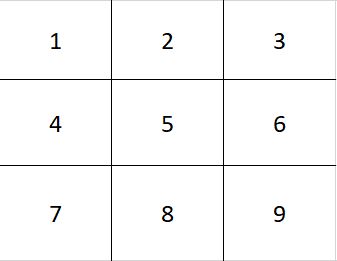def tictactoe():
Board = [1,2,3,4,5,6,7,8,9]
w = True
PlayerX = []
PlayerO = []
while len(PlayerO) < 9:
while True:
z = int(input("Player X: Select a place (1-9)\n"))
if z in Board:
Board[z-1] = []
PlayerX.append(z)
break
else:
print("Place not available! Choose another X")
while True:
y = int(input("Player O: Select a place (1-9)\n"))
if y in Board:
Board[y-1] = []
PlayerO.append(y)
break
else:
print("Place not available! Choose another O")
if len(PlayerX) > 2:
if set([1,2,3]).issubset(set(PlayerX)) or set([4,5,6]).issubset(set(PlayerX)) or set([7,8,9]).issubset(set(PlayerX)) or set([1,4,7]).issubset(set(PlayerX)) or set([2,5,8]).issubset(set(PlayerX)) or set([3,6,9]).issubset(set(PlayerX)) or set([1,5,9]).issubset(set(PlayerX)) or set([3,5,7]).issubset(set(PlayerX)):
print("Player X won!")
w = False
break
elif set([1,2,3]).issubset(set(PlayerO)) or set([4,5,6]).issubset(set(PlayerO)) or set([7,8,9]).issubset(set(PlayerO)) or set([1,4,7]).issubset(set(PlayerO)) or set([2,5,8]).issubset(set(PlayerO)) or set([3,6,9]).issubset(set(PlayerO)) or set([1,5,9]).issubset(set(PlayerO)) or set([3,5,7]).issubset(set(PlayerO)):
print("Player O won!")
w = False
break
if w is True:
print("Tie")
if input("Play Again (y/n)?\n") == "y":
tictactoe()
tictactoe()
I'm trying to make this code as efficient as possible. I'm new to Python and kinda limited with the knowledge I have. How can I simplify the code and especially the line shown below?
if set([1,2,3]).issubset(set(PlayerX)) or set([4,5,6]).issubset(set(PlayerX)) or set([7,8,9]).issubset(set(PlayerX)) or set([1,4,7]).issubset(set(PlayerX)) or set([2,5,8]).issubset(set(PlayerX)) or set([3,6,9]).issubset(set(PlayerX)) or set([1,5,9]).issubset(set(PlayerX)) or set([3,5,7]).issubset(set(PlayerX)):

